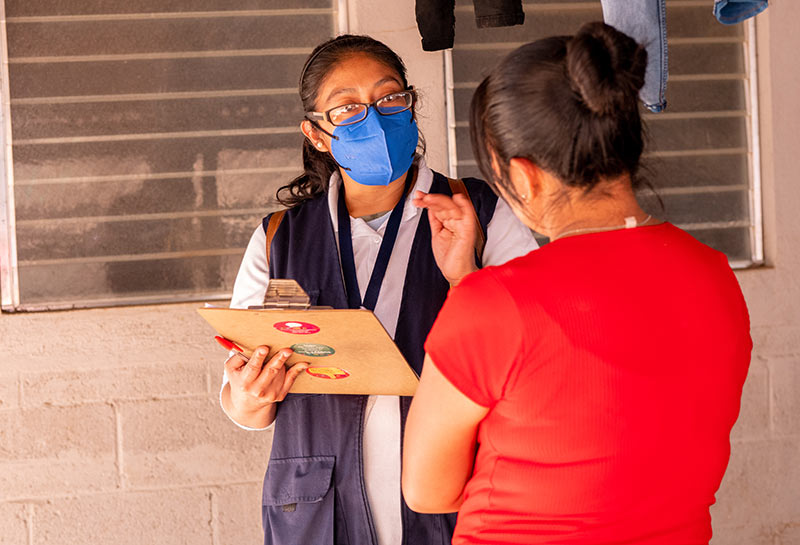In today’s world of immense economic, social and environmental challenges, addressing the concerns and various dimensions of poverty is no easy task.
As one of the largest relief and development organizations in the world, Food For The Poor is committed to transforming lives by providing those living in extreme poverty an opportunity to forge a path out of poverty.
Through sustainable community development projects, Food For The Poor works to improve the quality of life for families and communities. While each project has its own comprehensive plan, they all have one thing in common: a monitoring and evaluation component.
Often, organizations overlook this key element when creating development plans. But Food For The Poor understands the crucial role that monitoring and evaluation play in identifying interventions or activities that are producing the best results and assessing where changes need to be made.
One community where this process is making an impact is El Tablon, Guatemala.

El Tablon is a rural community facing a challenge shared by many impoverished communities: They have the determination and willingness to change their lives but lack the resources.
Food For The Poor and in-country partner Caritas Arquidiocesana are working together to change that. The first phase of this program aims to improve community participation, enhance the quality of education and address factors that contribute to food insecurity through workshops, diversification initiatives and technical training.
A series of initial assessments has already been conducted that will provide an understanding of the community’s needs and challenges, as well as its assets.
By including the Monitoring, Evaluation, Design, Accountability and Learning, or MEDAL, Plan in its sustainable community development projects, Food For The Poor will be able to measure outcomes of activities throughout the various phases.
According to Dianne Ortega, Monitoring and Evaluation Analyst at Food For The Poor, monitoring and evaluation is not just about measuring. “It’s also about learning so we know what works, what doesn’t work, how we can improve,” she said.
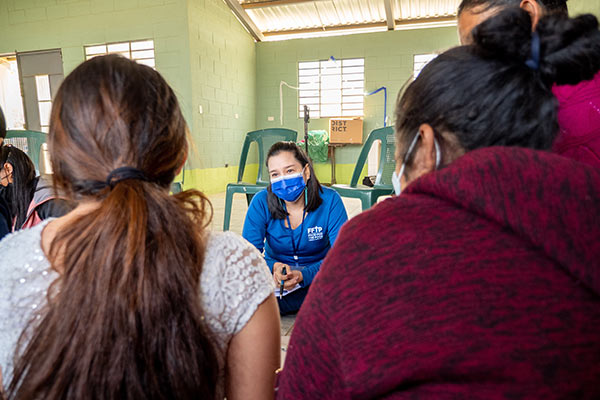
These key components shouldn’t just be optional add-ons or afterthoughts, but integral components of any sustainable development project. After all, the ultimate goal is to bring families and communities into self-sufficiency.
“We want them to have ownership over the development because part of sustainability is that we’re not there to help them anymore,” said Eli Kuan, a Food For The Poor Project Manager in Guatemala.
In this post, we’ll look at six important reasons Food For The Poor incorporates monitoring and evaluation tools into its blueprint for sustainable development projects in communities like El Tablon in Guatemala.
Six Reasons a Monitoring and Evaluation System Contributes to Successful Sustainable Development
1 – Assesses Progress in Real Time: Monitoring and evaluation tools help track the progress of a project. Through regular measurement and analysis of the project’s performance through the process, all stakeholders can determine whether the project is achieving its intended objectives and targets.
This way, adjustments and improvements can be made in real time and provide planners and implementers with the evidence-based information required to keep a project on track.
“Through monitoring, we’re able to identify what needs to be done from one point to another,” Kuan pointed out. “It helps us ensure that communities such as Tablon are walking towards development.”
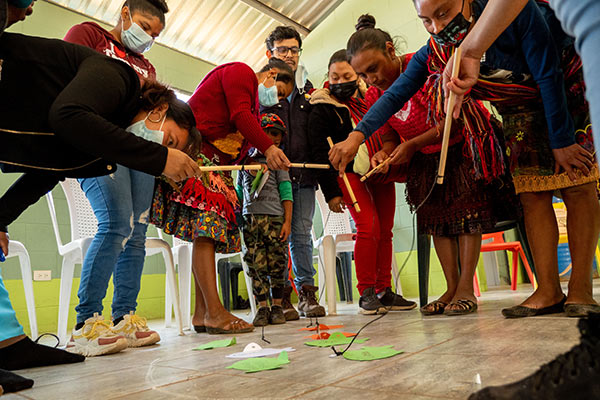
2 – Identifies Challenges and Opportunities: Tools like monitoring and evaluation systems allow project managers to identify challenges and bottlenecks that may hinder the project’s success as well as opportunities that can be capitalized on to enhance impact when unexpected problems arise.
In Tablon, that opportunity came when it turned out that the springs around the community were not going to provide enough water for the 400-plus families residing there.
According to Kuan, after monitoring the situation and conducting a hydrological study, project managers determined that drilling would be necessary.
“We were able to learn that below the community, in the aquifer, we had enough water to provide the community with water 8 hours per day,” he explained. “We wouldn’t have learned that if we wouldn’t have done our homework correctly.”
With evidence-based data available, project managers like Kuan can adapt and optimize their strategies. “This allows us to learn, to know the needs based on evidence, based on fact,” he said.
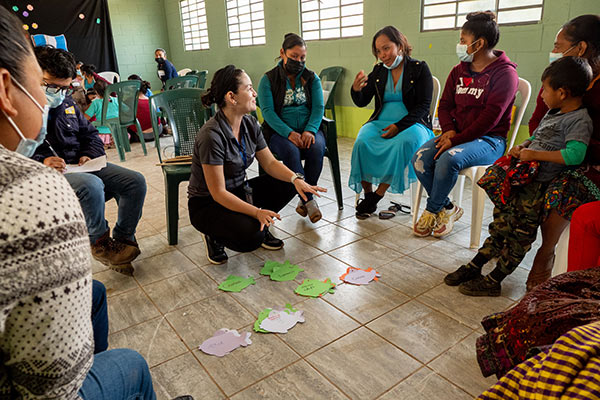
3 – Improves Resource Allocation: Sustainable development projects often have limited resources and it’s crucial to use them efficiently.
Having a monitoring and evaluation learning tool like MEDAL in place means information is backed by real data, and “we can make sure the funds we have from donors are used wisely, effectively and efficiently to tackle problems,” explained Alicia Narvaez, Food For The Poor’s Monitoring, Evaluation, Design, Accountability and Learning (MEDAL) Manager.
It also measures the degree to which the project has met its intended goal, preventing the waste of resources on ineffective approaches.
4 – Provides Accountability and Transparency: Transparency in monitoring and evaluation promotes accountability among all project stakeholders, fostering credibility and trust in the project.
In Tablon, donors will be able to see the progress of each step along the way, and know exactly how, where and when their money is being spent.
This is important, Ortega pointed out, because “we cannot just go there and decide what we’re going to do one day and then change our mind. We also have to show that the money is being spent efficiently.”
“This is not just for us as an organization, which is important,” she emphasized, “but it’s accountability to our donors and to the project participants.”
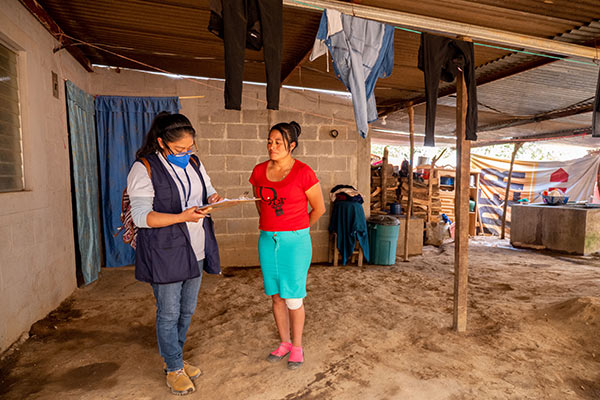
5 – Improves Decision Making: Sustainable development projects need to be grounded in evidence to ensure that they are effective and impactful.
Incorporating monitoring and evaluation systems into each comprehensive plan allows project managers to make informed choices based on data and adapt strategies accordingly.
This provides valuable insight and information that can be shared across projects and organizations, promoting learning from both successes and failures. It makes the replication of successful models possible and helps planners avoid pitfalls in future projects.
“With these lessons learned,” Kuan said, “we’re able to replicate in the new project proposal, reducing the mistakes, reducing the identifying challenges beforehand so that we’re able to implement better projects that in turn affect more people with greater impact.”
6 – Encourages Innovation: Through the lens of evaluation, project teams can identify areas of improvement, adapt strategies and explore creative solutions to overcome challenges.
This is very important, Ortega said, because when projects are not going as they should, “it really pushes you to think outside of the box and reimagine other strategies.”
Watch a video about the monitoring and evaluation process:
Embracing Monitoring and Evaluation for Successful Sustainable Development
Through evidence-based decision making, fostering innovation and encouraging accountability, monitoring and evaluation can bring sustainability to communities like Tablon, paving the way for a brighter future for everyone.
Success means standing on your own two feet, Kuan said. “We’re doing everything we can to set the strong basis, strong pillars, so that then in the future, they’re able to sustain themselves as a community.”
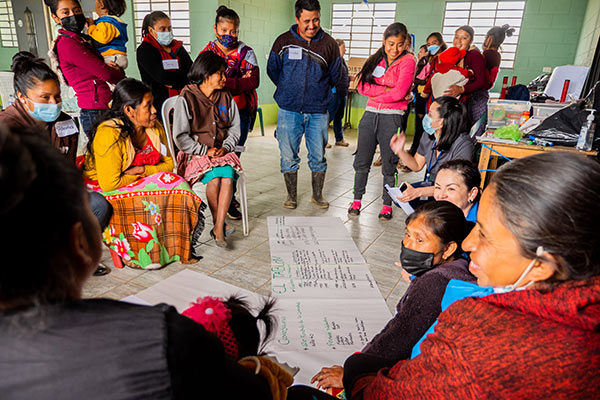
Your Support Can Make a Difference
Visit www.FoodForThePoor.org today and help transform lives for communities in need like Tablon to have a lasting impact for a better world.

